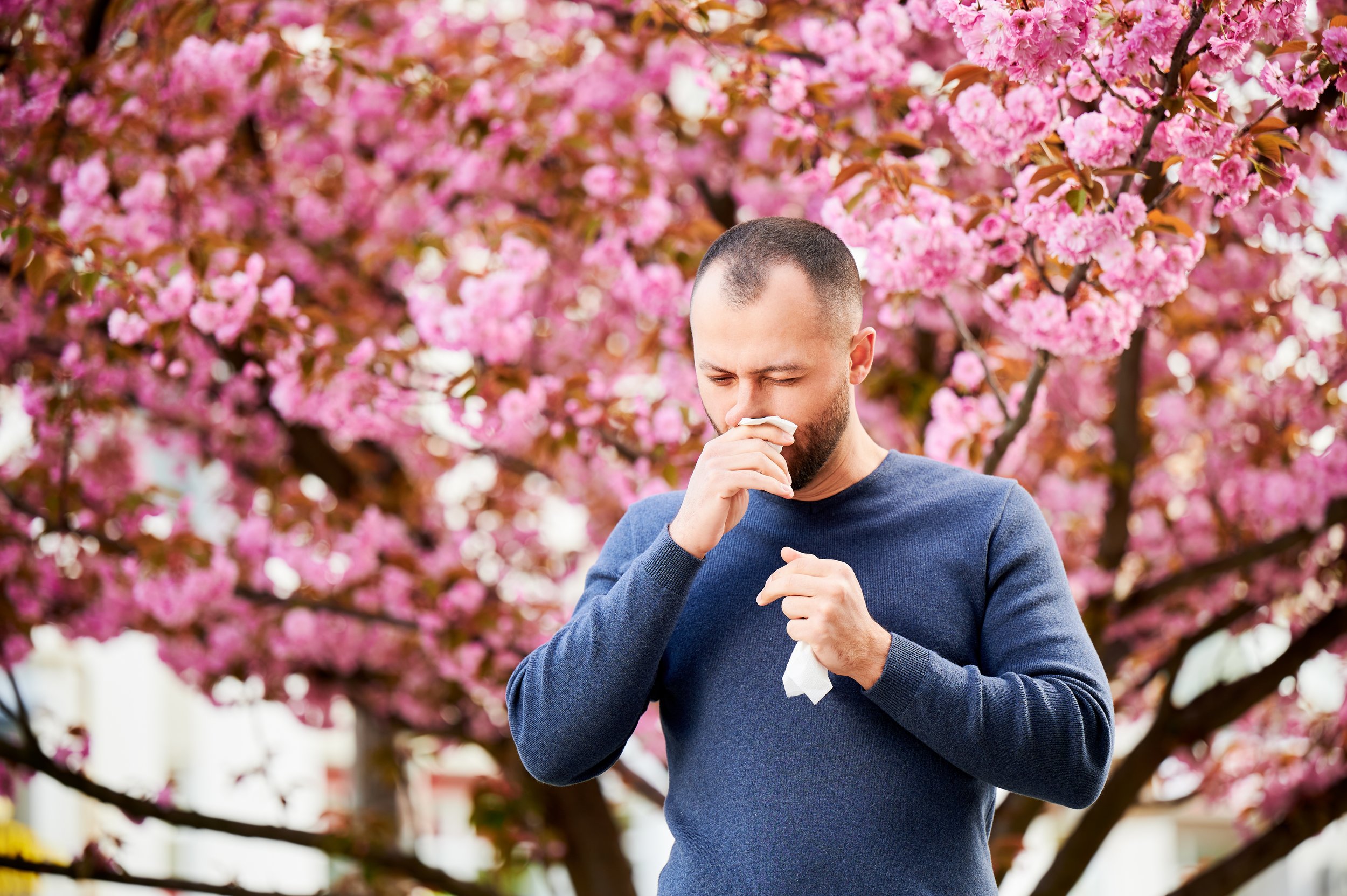Allergies & Acupuncture
A Brief Introductory Guide

Understanding the Challenges of Allergies and the Benefits of Acupuncture
Allergies are a common health issue that affect millions of people worldwide, presenting a wide range of symptoms that can significantly impact quality of life. Allergic reactions occur when the immune system overreacts to harmless substances such as pollen, dust mites, pet dander, or certain foods. Common allergic conditions include seasonal allergies (hay fever), allergic rhinitis, asthma, eczema, and food allergies. The symptoms, which range from sneezing, nasal congestion, and itchy eyes to more severe reactions like shortness of breath and skin rashes, can vary in intensity and duration. While conventional treatments like antihistamines and decongestants can provide relief, they may not address the root cause of the problem and can come with unwanted side effects. Acupuncture, a holistic therapy rooted in Traditional Chinese Medicine (TCM), offers a natural and effective approach to managing allergy symptoms and promoting overall immune health.
The Wellspring Integrative Approach
We at Wellspring Health are privileged to be a member of your care team. Wellspring Health uses Traditional Chinese Medicine (Acupuncture & Herbal Medicine) and Conventional medicine in an integrative approach. This combination can enhance treatment outcomes, manage the side effects of conventional treatments (like chemotherapy), and provide additional support for chronic or complex conditions. We love science and we love working with conventional medical Doctors. This approach combines the strengths of both systems, offering a broader range of treatment options and emphasizing the prevention of disease as well as the treatment of existing conditions.
Click to jump to section:
Challenges Associated with Allergies
Chronic Symptoms and Discomfort: People with allergies often experience chronic symptoms that interfere with daily activities. For those with seasonal allergies, exposure to allergens like pollen can cause symptoms such as sneezing, nasal congestion, itchy eyes, and throat irritation for weeks or even months. Similarly, individuals with asthma may experience difficulty breathing, wheezing, and chest tightness when exposed to certain triggers. This persistent discomfort can be exhausting and disrupt work, sleep, and overall well-being.
Impact on Sleep Quality: Allergic symptoms can significantly disrupt sleep quality. Nasal congestion and postnasal drip often worsen at night, making it difficult to breathe comfortably while lying down. Itchy skin or eyes can also cause sleep disturbances, leading to poor rest and fatigue during the day. Lack of quality sleep can exacerbate allergy symptoms, weaken the immune system, and increase irritability and stress levels.
Sensitivity to Environmental Triggers: People with allergies are often highly sensitive to environmental triggers, making it challenging to avoid flare-ups. Common allergens such as pollen, dust, mold, and pet dander can be difficult to control, especially during certain seasons or in specific environments. This constant vigilance and need to avoid triggers can cause stress and anxiety, further impacting quality of life.
Side Effects of Conventional Treatments: While conventional treatments like antihistamines, decongestants, and corticosteroids can provide symptom relief, they often come with side effects such as drowsiness, dry mouth, dizziness, and increased heart rate. Over time, some individuals may develop tolerance to these medications, reducing their effectiveness. Additionally, these treatments may not address the root cause of allergies and primarily focus on symptom management.
Emotional and Psychological Impact: The ongoing discomfort and restrictions imposed by allergies can lead to emotional and psychological distress. People with allergies may feel frustrated, isolated, or anxious about potential exposure to allergens. This emotional burden can further weaken the immune system and contribute to the frequency and severity of allergic reactions.
Weakened Immune Function: Allergies are essentially a result of an overactive immune response. This hyperactivity of the immune system can make it more susceptible to other infections or conditions. The immune system’s constant state of alertness can also lead to chronic inflammation, which can exacerbate other health issues.
From Our Clients
"I have been a chronic allergy sufferer for years. I gave acupuncture a try to compliment my shots and meds and the combo works great. I have had two great years for allergies and Kirsten is a critical part of my team."
-Bridget K.
“I have been going to Kirsten for 5 months and my experience with her has been nothing short of transformational. I initially went in for TMJ and after about 3.5 months of consistent treatment, I no longer wake up with headaches or the terrible jaw pain I've been dealing with for years! Kirsten has also been tremendously helpful in treating me for my sinus and allergy issues, which have been particularly bad this season. I really can't recommend her enough. She is knowledgeable, has a great bedside manner, and is someone I really trust.”
- Christina N.
“Wellspring helped me through a tough and mysterious allergy situation. They helped me figure out what was going on, treat the symptoms and get me on a path to permanent recovery. They are very smart and professional and the atmosphere is quite serene.”
- Britta S.
Benefits of Acupuncture for Allergies
Acupuncture is a natural, non-invasive therapy that can help manage allergy symptoms by addressing both the root cause and the resulting symptoms. It involves the insertion of thin, sterile needles into specific points on the body to stimulate energy flow, reduce inflammation, and promote balance within the body. Here’s how acupuncture can benefit individuals suffering from allergies:
Regulates the Immune System: Acupuncture helps modulate the immune response by restoring balance to the body’s energy (Qi). It can reduce the overactive immune response that causes allergic reactions, helping the body distinguish between harmless substances and real threats. This can decrease the frequency and severity of allergic symptoms and improve overall immune function.
Reduces Inflammation and Alleviates Symptoms: Acupuncture promotes the release of anti-inflammatory chemicals in the body, which helps reduce inflammation in the nasal passages, airways, and skin. This can alleviate symptoms such as nasal congestion, sneezing, itching, and skin rashes. Acupuncture also increases circulation, which supports the body’s natural healing processes and reduces swelling.
Improves Respiratory Function: Acupuncture can help open up the nasal passages, reduce mucus production, and improve airflow. This is particularly beneficial for individuals with allergic rhinitis or asthma, as it helps them breathe more easily and reduces the risk of respiratory complications. Acupuncture can also strengthen lung function, making it easier to cope with allergens in the environment.
Supports Stress Reduction and Emotional Well-Being: Stress and anxiety can exacerbate allergic reactions. Acupuncture helps activate the parasympathetic nervous system, which promotes relaxation and reduces stress levels. By calming the mind and body, acupuncture can help reduce the impact of stress on the immune system, leading to fewer allergic flare-ups and better overall well-being.
Enhances Overall Health and Vitality: Acupuncture treats the body as a whole, addressing not just the symptoms but the underlying imbalances that contribute to allergies. By promoting the flow of Qi and supporting the body’s natural healing processes, acupuncture helps enhance overall health, prevent future allergic reactions, and improve energy levels and vitality.
Provides a Safe, Drug-Free Alternative: Acupuncture offers a natural and effective alternative to conventional allergy treatments without the risk of medication side effects. It can be safely used in conjunction with other therapies and is suitable for individuals of all ages.
Conditions We Treat With Acupuncture
Acupuncture is used to address a wide variety of health conditions, including but not limited to:
Fertility & Pregnancy:
Female & Male Infertility, IVF/IUI, Labor Induction & Delivery, Trimester & Post Pardum Supports, and Lactation.Pain Management:
Chronic pain, arthritis, back and neck pain, migraines, and sciatica.Digestive Issues:
Irritable bowel syndrome (IBS), nausea, and gastritis.Mental Health and Stress:
Anxiety, depression, insomnia, and stress management.Women's Health:
Menstrual disorders, fertility support, menopause symptoms, and pregnancy-related conditions.Immunity, Allergies, Respiratory Conditions:
Allergies, asthma, and sinusitis.Neurological Disorders:
Stroke rehabilitation, Bell’s palsy, and peripheral neuropathy.Internal Medicine:
Stroke rehabilitation, Bell’s palsy, and peripheral neuropathy.Sleep Support & Insomnia:
Stroke rehabilitation, Bell’s palsy, and peripheral neuropathy.
Parting Thoughts:
Allergies present a wide range of challenges that can significantly impact quality of life. Conventional treatments often focus on symptom management but may not address the underlying causes or prevent future flare-ups. Acupuncture offers a holistic approach to allergy management by regulating the immune system, reducing inflammation, and supporting overall health. Through its multifaceted benefits, acupuncture can provide lasting relief from allergy symptoms, promote balance, and enhance quality of life for individuals struggling with allergies.
Resources & Links to Learn More
Acupuncture has been studied for its potential benefits in managing allergic conditions, particularly allergic rhinitis. Here are five clinical studies highlighting its positive effects:
Acupuncture for Allergic Rhinitis: A Systematic Review and Meta-Analysis: This study assessed the efficacy and safety of acupuncture for allergic rhinitis (AR). The analysis concluded that acupuncture improved nasal symptoms and quality of life in adults with AR, suggesting its potential as a beneficial treatment option. European Journal of Medical Research
Acupuncture Methods for Allergic Rhinitis: A Systematic Review and Bayesian Meta-Analysis of Randomized Controlled Trials: This review explored various acupuncture methods for treating allergic rhinitis. The findings indicated that acupuncture significantly alleviated nasal symptoms and improved quality of life, supporting its use in AR management. Clinical Medicine Journal
Acupuncture for Allergic Rhinitis: A Systematic Review: This systematic review evaluated randomized clinical trials on acupuncture for allergic rhinitis. The study found that acupuncture was effective in reducing nasal symptoms and improving overall well-being in patients with allergic rhinitis. ANNA Allergy
Acupuncture in Allergic Rhinitis: This article discusses the potential mechanisms and clinical effects of acupuncture in treating allergic rhinitis. It highlights studies that describe a modulating effect of acupuncture on the cytokine profile with simultaneous improvement of signs and symptoms. SpringerLink
Acupuncture Evidence Summary for the Treatment of Allergic Rhinitis: This summary provides an overview of evidence supporting acupuncture as an effective treatment for allergic rhinitis. It suggests that acupuncture is safer than commonly used medications and may be more cost-effective. Evidence Based Acupuncture
These studies suggest that acupuncture offers benefits in managing allergic conditions, particularly in alleviating symptoms of allergic rhinitis and improving patients' quality of life.











